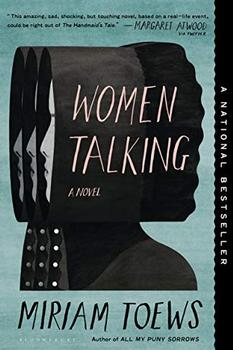Page 1 of 1
There are currently 2 reader reviews for Women Talking
Write your own review!
Debra Caspers
Beyond the Trauma
These Mennonite women are facing both personal and community trauma. Their bravery in doing this engages the reader. The implications of their deliberate choices impacts their lives in a healing way. The implications to the world of patriarchal religious leadership gives one pause.
 Cathryn Conroy
Emotionally Charged and Haunting. Not an Easy Book to Read, But Vitally Important
Cathryn Conroy
Emotionally Charged and Haunting. Not an Easy Book to Read, But Vitally Important
This is a novel that will haunt you. It is not only deeply disturbing, but also an ominous warning about the powerful authority and absolute control some men exert over women — both their minds and their bodies.
Taking place in a tightly-knit and isolated Mennonite community, virtually the entire book is the minutes of several secret meetings a group of women is holding in a hayloft. They are discussing their future. All of them, along with almost every other woman and girl in the colony, were repeatedly raped over five years by eight men in the community, who stole into their bedrooms in the middle of the night, knocking them out with an animal anesthetic, and then having their way with them. The women and girls would awake in the morning groggy and confused and covered in blood, feces, and semen. Even a three-year-old girl was violated in the same way. The women were told that Satan had visited them to punish them for their sins.
But that is not the story of this book.
The story is what happens after the women finally figure out what is going on. Because one woman attempted to kill one of the men with a scythe, the police were called to take the men to jail in the nearby city — for their own safety. And now the women are trying to discern what they will do to protect themselves in the future, including possibly leaving the community — a bold and intimidating step, since they have no idea where they are geographically. However unlikely it is, the narrator of the story is a man. The women trust him, and since they are illiterate, they want him to write what happens at the meetings.
There are many ways, some of which could have been quite salacious, that author Miriam Toews could have written this story, which is (shockingly) based on true events in a Mennonite community. What she did was to zero in on how women everywhere solve their problems: by talking about it. These hayloft discussions, filled with anger and deep-seated psychological pain, are heated with diverse opinions, sometimes unfocused, but always fruitful. Above all, the discussions are philosophical reflections on the meaning of their lives.
And at the root of it all is the question the women must eventually answer: Can they forgive the rapists, who are, after all, their husbands, brothers, uncles, and nephews, for the evil deeds they did? Is forgiveness even possible? And if not, how can the women remain in community with the men?
Because it is so emotionally charged, this is not an easy book to read. But it is an important one…a vitally important one.
